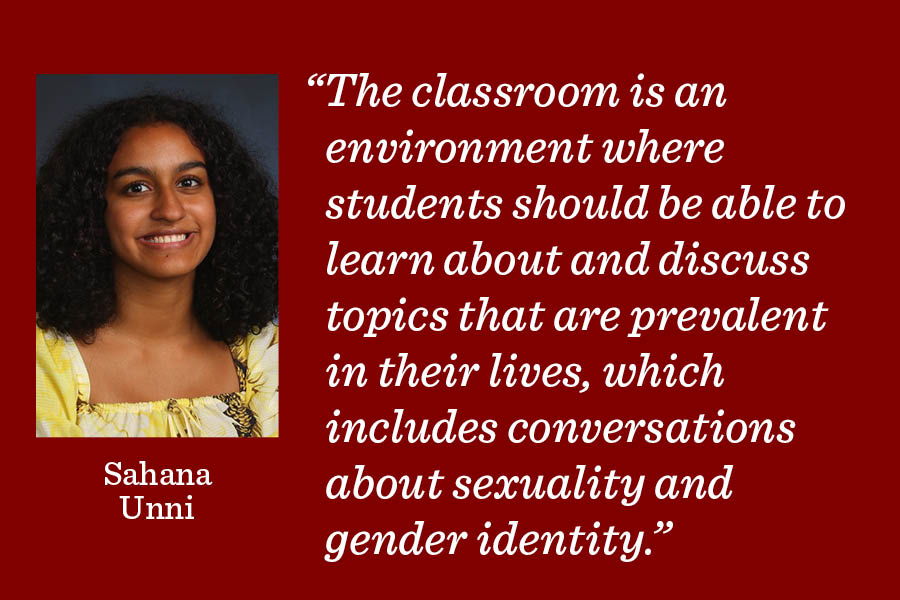Curriculum should be guided by student needs rather than parents
Midway Staff
Florida’s new so-called “Don’t Say Gay” bill compromises the real goals of education, argues content manager Sahana Unni.
March 28, 2022
On March 28, Florida Gov. Ron DeSantis signed into law the “Parental Rights in Education” bill, which restricts discussions about gender identity and sexuality with young students, and requires teachers to notify parents when any “mental, emotional or physical health” services are provided to a student. Critics nicknamed it the “Don’t Say Gay” bill and say it will make schools more dangerous for LGBTQ-identifying students.
Schools should work to create a safe and educational environment for students, focusing on student needs above parental input. This law allows parents to sue for any violation, intimidating faculty who would have otherwise been willing to have confidential conversations with students. Curriculums being taught need to prioritize the education of students, not satisfying parents.
The “Don’t Say Gay” law potentially poses a threat to students residing in other states where Republicans dominate the legislature, with Louisiana already having filed similar legislation. Although Illinois has a Democratic governor and legislature, 23 states are run by a Republican governor and legislature, allowing legislation to threaten students receiving an education in almost half of the country.
Many supporters have claimed that the legislation focuses on parental rights, not ostracizing certain communities, but the vague language leaves LGBTQ students’ rights up to interpretation. Of course, parents should be able to have conversations about gender identity and sexuality with their children, but that doesn’t mean educators shouldn’t also have the ability to facilitate them. Despite appearing to focus on young students, provisions can impact all grade levels due to highly subjective wording, such as requiring discussions about sexuality and gender to be “age-appropriate or developmentally appropriate.” Topics in general being taught to young children should absolutely be age-appropriate, but it is in targeting LGBTQ students that the law becomes harmful.
Student identities are not up for debate and do not change based on parental approval. The debate incited by this bill is extremely harmful to queer students accross the country, as it ostracizes them from their peers, whose rights and identities are not currently being scrutinized.
The classroom is an environment where students should be able to learn about and discuss topics that are prevalent in their lives, which includes conversations about sexuality and gender identity. Many LGBTQ people have played important roles in history which should not be dismissed because of their gender identity or sexuality. Likewise, books featuring queer characters or themes should not be deemed inherently more sexual. Learning about LGBTQ themes in no way sexualizes or grooms children, as many supporters of the bill have claimed, but rather teaches them about real-world topics they may not otherwise be exposed to.
The “Don’t Say Gay” bill is unlikely to be passed in Illinois and even less likely to affect students at Lab, but that doesn’t make the issue any less important. Sign petitions. Attend protests. Work to ensure queer students in Republican-dominated states are able to feel safe expressing their identity at school. This bill politicizes the well-being of children and diminishes student input on school curriculums necessary for a true education.




























































